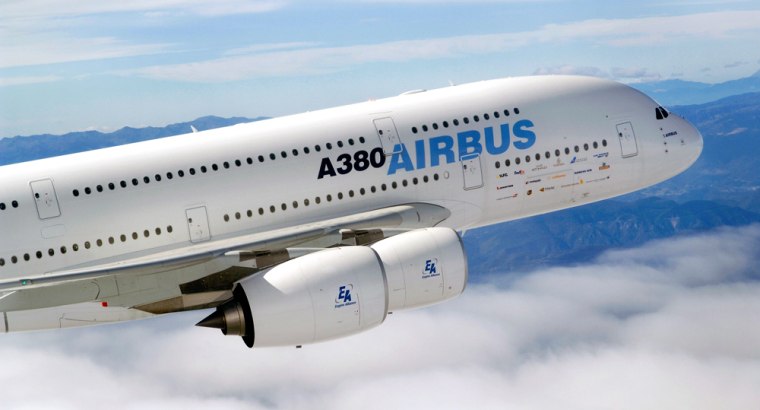The biggest financial crisis in Airbus’ 36-year history could be a boon to commercial airlines.
After breaking its delivery dates three times on its super-jumbo A380 jet, Airbus sales executives are courting customers all over again to keep them from dumping the new model.
Even though the plane is overweight and wrought with production snafus, some industry insiders say airlines should think twice before sending the superjumbo packing.
If they’re patient and don’t urgently need the airplanes, airlines could end up getting "the deal of the century," one analyst said.
“Airbus has to go to every customer hat in hand, get down on their knees and say, What can I do to make it right?’’ said Edmund Greenslet, publisher of Airline Monitor, a trade publication. “One way to make it right is to make it cheaper.”
In the meantime, A380 customers, many of whom already received 30 to 40 percent discounts for being the first to sign up for the 555-seat "cruise ship of the skies," are demanding financial compensation for three rounds of delivery delays since June 2005.
In just 19 months, the giant, double-decker passenger plane has gone from being Europe’s crowning engineering achievement to what some view as a white elephant that is two years behind schedule and expected to cost the company billions in lost profits.
“My advice to airlines would be don’t bail out. Stay on board and use your leverage to get all the bells and whistles you want for free,’’ Greenslet said.
Aviation consultant Scott Hamilton agrees, saying airlines would be crazy to cancel A380 orders today.
“By the time the airlines get through raking Airbus over the coals, we wouldn’t be the least bit surprised if the launch-order A380 pricing wound up being in the $100 million range,’’ Hamilton wrote in a recent report to clients. “Getting the A380 for this little amount would be the deal of the century.’’
The A380 has a list price of $300 million, although airlines rarely pay the list price for new aircraft.
While deep discounts are expected on the A380, not all airlines can afford to wait it out, noted Forecast International aerospace analyst Raymond Jaworowski.
FedEx Corp., one of Airbus’s most loyal customers, this week canceled its order for 10 of the A380 freighter models because of the delivery delays. It turned to rival Boeing Co. for 15 Boeing 777s because they could be delivered more quickly. The 777 has a list price of $178 million to $240 million, depending on the version.
Airbus’ 15 remaining freighter orders — 10 from United Parcel Service Inc. and five from International Lease Finance Corp. — still need to be “reconfirmed’’ and are in the “cancellation zone,’’ according to executives from Airbus' parent, European Aeronautic Defense and Space Co.
UPS and ILFC reportedly are holding onto their orders while they weigh their options with Airbus, which has blamed wiring difficulties for its production delays.
EADS officials last month estimated that the A380 delays will cut $6.1 billion from earnings through 2010. This week the company reported a third-quarter loss of $245 million, largely because of the production delays. Officials have said the company will not make a profit on the A380 until it has sold 420 units, up from last year’s forecast of 270.
That could take decades, although some analysts point out that the 747 jumbo jet, which nearly bankrupted Boeing, also took many years to become profitable.
Without FedEx, Airbus still has 149 orders for the A380 from 15 customers, including Emirates, Singapore Airlines Ltd. and Australia's Qantas Airways Ltd.
Richard Aboulafia, vice president of the Teal Group, an industry consulting business in Fairfax, Va., says the A380 debacle casts doubts on the company’s ability to fund new planes, such as the A350 — a new widebody jet designed to compete with Boeing’s fast-selling 787 and 777.
“That’s the airplane they should have built from the word go,’’ Aboulafia said, who added that the A380 “should never have been born.”
Paul Nisbet of JSA Research in Newport, R.I., said Airbus in time will earn back respect and orders for the A380 by demonstrating the operation and viability of the aircraft.
“Eventually it will be an operational success,’’ Nisbet said. “How long it will take or if they ever achieve economic success remains to be seen.”
A decision on whether to go ahead with the proposed long-range A350 is expected in the next few weeks.
Without an A350 launch, Airbus will soon have nothing competitive to sell in the crucial 200- to 400-seat segment, Aboulafia said. “Getting the A380 back on track after a two-year delay won’t save the company from marginalization without the A350.”
In wake of the latest delays, Virgin Atlantic Airways postponed delivery of its first A380s until 2013. Emirates, the Dubai-based airline that is the program’s biggest customer with 45 planes on order, said it was sending an audit team to France to check on the latest delivery schedule. Its first A380 is expected to be delivered in August 2008 — a time when the airline originally was supposed to have 18.
Meanwhile, Qantas, which has already been compensated for the delays, recently ordered eight A380 superjumbos on top of the dozen it had already said it would buy. It was the first A380 order this year.
Qantas officials said they had negotiated an "attractive package" for the additional jets. It also ordered four A330s to help fill the gap left by the two-year delay to the A380 delivery timetable.
“I wouldn’t be surprised if Airbus threw in those planes (A330s) practically for free,’’ Greenslet said. “The pricing power has shifted from the seller to the buyer. Airlines can more or less dictate a price right now, and Airbus is in no position to haggle.”
